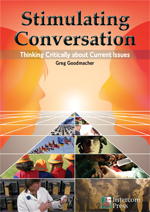Stimulating Conversation
From My Gut, Soul, and Pedagogical Beliefs: Stimulating Conversation
Greg Goodmacher

Every textbook writer who really cares about his or her product pours the proverbial “sweat and tears” into their materials, but many writers will, in private conversation, speak about a textbook that is their most personally meaningful. Stimulating Conversation is the book that I worked the hardest on to get published, and it is the one that came from my gut, soul, and pedagogical beliefs.
Getting published was difficult because many textbook companies do not touch textbooks that deal with controversial topics, especially if the topics are ones such as sex education and STDs, educational reform, and the rights of foreigners (This situation, though, is slowly changing.). However, I realized years ago that many college students enjoy thinking about and discussing these topics. For several years before writing Stimulating Conversation, I taught with somewhat “controversial” textbooks that required me to create supplementary materials. Students were responding more enthusiastically to my materials than the ones produced by global EFL publishers, so I decided to write my own book. I believed that students around the world would appreciate unique activities that pushed the limits of what is usually taught in EFL classes.
Large publishers and traditional Japanese publishing companies rejected my proposal, but Intercom Press, a tiny publishing company, believed in me and my textbook concept. We worked together for almost two years. Stimulating Conversation is not a perfect book, but I believe that it effectively challenges students to create novel sentences, to think critically, to discover their own values, and to communicate.
Unlike the textbooks of many publishers which are designed so that any unprepared teacher can walk into a classroom, open the book to any page, and know exactly what to do, this book challenges teachers. Stimulating Conversation has a variety of activities, and many are unique exercises numerous teachers and students have not encountered beforehand. Of course, the book includes simple information gap activities, etc., but most of the activities and questions, like questions in the real world, cannot be answered by a small number of example answers. Many answers are based on students’ personal opinions, not specific right or wrong answers. Students will have lively conversations.
Stimulating Conversation is what I call a thinking/conversation textbook for intermediate and advanced level students, which it seems is a shrinking segment of the EFL textbook market in Japan. Because of its unique characteristics, because it is published by a tiny publisher, and because it is sold only in Japan, I am not making much money from it. However, the enthusiastic comments from my students and the positive feedback from the teachers who repeatedly order my book for their students thrill me and give me more of a sense of pride than my other books which have sold more copies.
See sample pages online and to request a sample copy, go to l. Scroll down to see sample sections. To receive a sample textbook, click on a link on the left side of the page.


